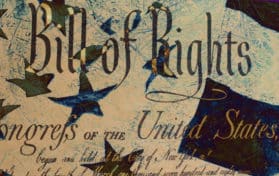
Archbishop Desmond Tutu, of the most prominent leaders against South Africa’s Apartheid, died yesterday at the age of 99.
Desmond Tutu originally wanted to be trained to be a medical doctor. He could not afford the schooling necessary to train him for this life path, so he trained to be a teacher. After two years, this choice still did not fulfill the future civil rights icon.
He then would study theology to become a priest in the Anglican church in South Africa. From there, an appointment in 1978 propelled him to an important leadership position. He began drawing attention to the human rights issues plaguing South Africa at the time, and, in 1984, he would win the Nobel Peace Prize for his role in not only drawing attention to apartheid, but he would also be noted for his influence in peaceful protests as well as the use of economic pressure in order to effect change.
Tutu was known for his sense of humor as well as his inspirational messages. On Sunday, at the age of ninety, Tutu passed away.
The current South African president, Cyril Ramaphosa, recalled Tutu as a “patriot without equal.”
Tutu’s work in the struggle against apartheid in his native South Africa – an institution in which black South Africans could not own property, could not intermarry with white South Africans, and other forms of racial segregation were rampant (and legal) – began over sixty years ago. Tutu was affectionately nicknamed “the Arch” by his contemporaries. It was not until the early 1990s that the work of Tutu came to fruition; his diligence brought international attention to the effects of apartheid in South Africa.
It was only after multiple nations applied pressure to the leadership in South Africa – and whispers of a potentially violent civil war among the white and black South African people – that Nelson Mandela was released from prison in 1990. Shortly after, Mandela would be elected the president of the country, and the laws enabling the practice of apartheid were soon abolished.
Once Mandela was elected, “the Arch” was named the chairperson of South Africa’s Truth and Reconciliation Commission.
The Nelson Mandela foundation described Tutu’s passing as “immeasurable.”
The foundation added in a written statement: “He was larger than life, and for so many in South Africa and around the world his life has been a blessing . . . His contributions to struggles against injustice, locally and globally, are matched only by the depth of his thinking about the making of liberatory futures for human societies.”
Tutu’s honors for his work to end the rampant discrimination in his native land did not end with the award of the Nobel Peace Prize in 1984. Former President Barack Obama presented Tutu with the Presidential Medal of Freedom in 2009. Obama has referred to Tutu as a “mentor, friend, and moral compass.”
President Joe Biden released a statement regarding the passing of the civil rights leader on Sunday evening as well: “His (Tutu’s) legacy transcends borders and will echo throughout the ages.”
Tutu’s influence and persistence brought so much international attention to the racial segregation in South Africa that American recording artists boycotted the area in the 1980s. In 1985, a group of musicians formed the Artists United Against Apartheid. The group recorded “Sun City”, a song written by Steven Van Zandt, who was a member of Bruce Springsteen’s E Street Band as well as a solo artist in his own right.
The song and video garnered a great deal of attention on MTV, with the video on regular rotation. The proceeds from the accompanying album – totaling over $1 million – would be donated to assisting various anti-apartheid projects.
The gathering of American artists is just one example of how Tutu’s legacy would transcend international borders. The country was also banned from participating in the Olympics games between 1964 and 1988.
In 2012, Tutu was awarded a Mo Ibrahim Foundation grant; in 2013, Tutu would be honored with the Templeton Prize. England’s Prime Minister, Boris Johnson, also praised Tutu’s life work. Johnson said: “He will be remembered for his spiritual leadership and irrepressible good humor.”
The Anglican Church of South Africa will plan the funeral and memorial services of “the (beloved) Arch.”





